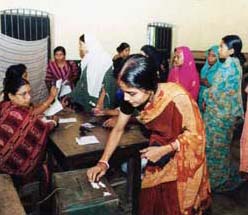The Cameroon Democratic Union is a political party in Cameroon. It was founded by Adamou Ndam Njoya, a former Minister of National Education under President Ahmadou Ahidjo, on 26 April 1991.

Elections in Mozambique gives information on election and election results in Mozambique.

Elections in Azerbaijan gives information on election and election results in Azerbaijan.

Elections in Bangladesh gives information on election and election results in Bangladesh.

Elections in Benin take place within the framework of a multi-party democracy and a presidential system. Both the President and the National Assembly are directly elected by voters, with elections organised by the Autonomous National Electoral Commission (CENA).

Elections in the Comoros take place within the framework of a multi-party democracy and a presidential system. The President and the majority of the seats in the Assembly of the Union are directly elected.

Côte d'Ivoire elects on national level a head of state - the president - and a legislature. The president is elected for a five-year term by the people. The National Assembly has 225 members, elected for a five-year term in single-seat constituencies. Côte d'Ivoire is a one party dominant state with the Ivorian People's Front in power. Opposition parties are allowed, but are widely considered to have no real chance of gaining power. Following a peace deal between the government and former rebels in March 2007, the next elections were planned for early 2008. These elections however, were postponed to November 2009 first, and then to early 2010.

Elections in Niger take place within the framework of a semi-presidential system. The President and National Assembly are elected by the public, with elections organised by the Independent National Electoral Commission (CENI).

Elections in Kuwait are held for both the National Assembly and for the Municipality. Kuwait's constitution calls for elections to the unicameral National Assembly at a maximum interval of four years. Elections are held earlier if the Constitutional Court or Emir dissolve the parliament.

Elections in Togo take place within the framework of a presidential system. Both the President and the National Assembly are directly elected by voters. The country is a one party dominant state with the Union for the Republic in power.

Mahamadou Issoufou is a Nigerien politician who has been President of Niger since 7 April 2011. Issoufou was the Prime Minister of Niger from 1993 to 1994, President of the National Assembly from 1995 to 1996, and he has been a candidate in each presidential election since 1993. He led the Nigerien Party for Democracy and Socialism (PNDS-Tarayya), a social democratic party, from its foundation in 1990 until his election as President of Niger in 2011. During the Presidency of Mamadou Tandja (1999–2010), Issoufou was the main opposition leader.

The 2005 Azerbaijan parliamentary election was held on November 6. It pitted candidates of the ruling New Azerbaijan Party against opposition led by the Azadlıq (Freedom) bloc of the Azerbaijan Popular Front Party, the Equality Party and Azerbaijan Democratic Party. The polling stations closed 19:00. The result is contested, with allegations of vote-rigging from the opposition and outside groups.

Parliamentary elections were held in Senegal on 3 June 2007. They had originally been planned to be held together with the presidential election on 25 February 2007, but were postponed. Fourteen parties or coalitions participated in the elections, but they were marked by a major opposition boycott. The ruling Sopi Coalition won 131 seats, including all 90 of the seats elected by majority voting.

A parliamentary election was held in Madagascar on 23 September 2007, with the vote to be repeated in two constituencies on 14 November 2007. 637 candidates contested the election, in which the 127 seats in the National Assembly were at stake.

Early general elections were held in Kuwait on 27 July 2013. The elections were required after the Constitutional Court dissolved Parliament and annulled the results of the December 2012 elections. Voter turnout was an estimated 52.5%, which was higher than expected despite an opposition boycott, and only 7% lower than the non-boycotted February 2012 elections.

General elections were held in Bahrain on 22 November 2014, with a second round on 29 November in constituencies where no candidate received at least 50% of the vote. The elections were boycotted by the Shiite Islamist opposition. The government announced the voter turnout as 52.6%, although the opposition claimed it was only 30%.

Parliamentary elections were held in Burundi on 29 June 2015. The vote had been initially set for 5 June 2015, alongside local elections, but it was delayed due to unrest. Indirect elections to the Senate occurred on 24 July.

General elections were held in Niger on 21 February 2016, with a presidential run-off held on 20 March. A total of 15 candidates ran for the presidency, with incumbent President Mahamadou Issoufou running for re-election for a second term. There were two main opposition candidates also vying for the top post, Seyni Oumarou of the MNSD, who lost to Issoufou in 2011, and Hama Amadou of MODEN/FA, who has been campaigning from prison since November 2015. Most of the opposition agreed to align for the second round to back the second-placed candidate against Issoufou.

Parliamentary elections were held in Seychelles from 8 to 10 September 2016. Three parties and three independent candidates ran for the 25 directly-elected seats. The result was a victory for the opposition Linyon Demokratik Seselwa alliance, which won 19 of the 33 seats. It was the first time since the 1979 elections that the People's Party did not win a majority of seats.






















